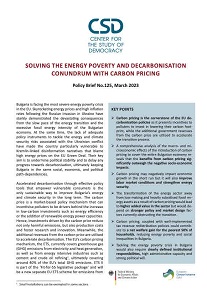CSD Policy Brief №. 125: Solving the Energy Poverty and Decarbonisation Conundrum with Carbon Pricing.
CSD Policy Brief №. 125: Solving the Energy Poverty and Decarbonisation Conundrum with Carbon Pricing.
Author(s): Author Not Specified
Subject(s): Environmental and Energy policy, International relations/trade, Green Transformation
Published by: Център за изследване на демокрацията
Keywords: energy-dependency from Russia;
Summary/Abstract: Bulgaria is facing some of the most severe energy poverty risks in the EU. Skyrocketing energy prices and high inflation rates following the Russian invasion in Ukraine have starkly demonstrated the detrimental impact from the slow pace of the energy transition and the excessive fossil energy intensity of the Bulgarian economy. At the same time, Kremlin-linked disinformation narratives that blame high energy prices on the EU Green Deal aim to undermine political stability and to delay the country’s long-term decarbonisation policy, ultimately keeping Bulgaria in the current socio-economic, political and energy path-dependencies. // Carbon pricing, the cornerstone of the EU decarbonisation strategy, coupled with well-implemented tax revenue redistribution policies, could contribute to a net welfare gain for the poorest 50% of Bulgarian households, reducing energy poverty and social inequalities in the country. It would also provide macroeconomic benefits such as improving the labour market conditions, increasing the value added of the energy sector, and strengthening energy security without slowing economic growth in the process. These are some of the key takeaways from a comprehensive assessment of the macro- and microeconomic effects of the introduction of carbon pricing to cover the entire national economies of Bulgaria Germany, Romania, Hungary and Poland.
Series: Center for the Study of Democracy - CSD Policy Briefs
- Page Count: 10
- Publication Year: 2023
- Language: English
- Content File-PDF

